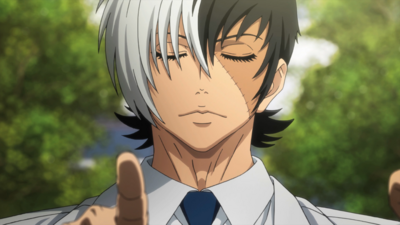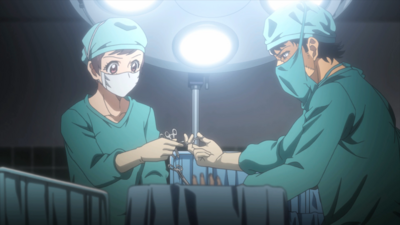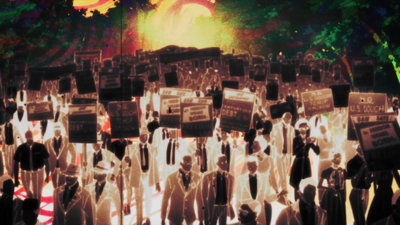

 |
 |
||||
| Home | Reviews | Extras | Forums |
|
Young Black JackSynopsisIt's 1968: the world is in the middle of the Vietnam War, the conflict has dragged on for years, and anti-war student protests are spreading throughout Japan. Seemingly uninterested in this, Kuroo Hazama is an aloof, mysterious young man with a prominent scar on his face enrolled in medical school; his skills with a scalpel are, it turns out, as legendary as his penchant for disregarding rules, conventions, and etiquette, and he's quickly making a name for himself as an exceptionally talented but eccentric surgeon. Such is the man who will one day come to be known only as "Black Jack." ReviewIf you're going to talk to somebody about Osamu Tezuka, the "godfather of manga," then Black Jack will probably be one of the first manga they'll think of: in the States, it's probably his most popular series, at least among otaku who aren't specifically fans of retro manga. That might have something to do with the character design, which is a bit less obviously Disney-ish than in some of his other works, meaning that it seems a bit less out of place among the spectrum of modern anime designs. But another aspect is that the basic plot is "grizzled lone-wolf character on a grim, lonely quest to escape and potentially dismantle a corrupt system", and that's a very popular narrative on this side of the Pacific. Not to mention, medical dramas have been a big thing in the U.S. for a few decades, now. Because of this, Black Jack has had a better track record with anime adaptations than most of Tezuka's other manga. Now, the Young Black Jack manga is unusual in that it's authored by two guys using Tezuka's characters rather than Tezuka himself, which happens all the time in the States but is rare and usually pretty controversial in Japan. I'm not familiar enough with the Japanese fandom to talk about what the reactions have been like over there, but on this side of the Pacific, this particular spinoff has gotten some grilling for being far too different from the spirit of the manga; as for me, I've *liked* what I've read of Black Jack, but that hasn't been much at all, and so I don't want to dwell on comparisons, though I'll talk about them in this review. Basically, Young Black Jack is an entertaining but pretty predictable medical drama; the big problem is that it's stupidly simplistic as far as politics go, and the show seems to go out of its way to make anybody who isn't named Kuroo Hazama seem like an incompetent ass. Young Black Jack is nice-looking but kind of bland as far as the technical aspects go. The animation can be choppy, especially during the more action-heavy scenes, and Tezuka's talent for framing just isn't here; honestly, I sometimes wonder if the reason that his manga don't get many adaptations is that his style is *very* hard to get right, and there's also a ton of pressure to *get* it right given the pedigree. But the character designers do a nice job of keeping Tezuka's original characters recognizable while smoothing out some of the most cartoonish, Disney-ish character shapes that would look out of place here. The purists might cry "foul!", but I think it's a smart move...one of the cooler things about the show is the ED sequence, in which two playing cards sit side by side, rotating around to reveal a sketch of a character from Tezuka's original manga on one card and their updated design on the other. Keeping a Tezuka tradition up (and helping the nostalgia factor), Tabata and Okuma use a large number of characters from his other series in their script, and those side-by-side comparisons end up being a big help when we meet some of them; look for Hyakkimaru from Dororo to make a prominent appearance, for example. Speaking of the music, the opening and ending themes are both catchy rock numbers, though I don't have much to say about the in-show music. In the words of fellow reviewer Aiden, I'd call it a "competent but not brilliant" show as far as production goes, and director Mitsuko Kase does a fine job of balancing the tastes of modern anime audiences with old-school elements. It's also clear that she kept the tastes of straight female viewers in mind: there's lots and lots of manservice potential in shots of Black Jack's bare and exceptionally muscular torso (there's also lots and lots of these shots).   But Black Jack is not yet technically "Black Jack" here but a normal medical student named Kuroo Hazama, or at least ....somewhat more normal than we're used to. He's still recognizable as Black Jack because of his scars, and because his personality as an independent-minded and somewhat dour, curmudgeonly, and eccentric character isn't much changed from his portrayal in Tezuka's original manga; not to mention, he's still as impeccable a surgeon as ever. The rules of TV censorship, sadly, take the fun of seeing some of the details of his operations out of the picture, which is a shame for me (though maybe an incentive for people who are more squeamish), but the animation does noticeably pick up in quality during his surgeries. In fact, the only real difference between this show and Tezuka's original manga, in terms of characters or basic structure, is that Pinoko isn't here, which might be either good or bad depending on how you feel about her. Anyway, that point is that Young Black Jack doesn't exactly feel like an origin story because Kuroo Hazama the medical student really isn't all that different from Black Jack the rogue doctor, and for better or for worse, this is simply more Black Jack. You could argue that it was pointless to make or that it's a cash cow, because of this; my suspicion is that given how popular the character is, anybody besides the now long-deceased Osamu Tezuka who tried to talk about how Black Jack's personality formed as it did would be stepping into a minefield, since he's basically sacred as a character, by now, and any deviation from Tezuka's character mold might basically be sacrilege. I say that this is still Black Jack "for better or for worse" because on the one hand, Young Black Jack works very well as a medical drama, but on the other hand, when it comes to us learning how exactly he turned into a rogue, the show just dodges the question, and the last episode is very open-ended about where that exact transition occurs. Black Jack's encyclopedic knowledge of obscure diseases and conditions is really something amazing, as are his borderline-miracle maneuvers: the wonderful thing, of course, is that while they seem miraculous, there's plausible science behind all of them, and the writers of the Young Black Jack manga did a good job of keeping up Tezuka's legacy of accurate science (he was a doctor, after all). But Black Jack doesn't have much to learn, here, and he can come across as a Jesus figure; maybe the original manga touched more on his training (again, I've only read scattered chapters of it), but here, he's already a hyper-competent surgeon. I think that one reason Black Jack is so popular in the States is that Black Jack himself is honestly something of a superhero. He has an unusual origin story, as a badly maimed orphan patched together by a master surgeon (however vaguely alluded to in this version), and he's both extremely talented and absolutely intent on doing his work outside of "the system." I have to admit that while I liked this show, I'm really just not that interested in traditional superhero stories, perhaps because I tend to find that writing "moral outsider" stories tends to be a convenient way to avoid addressing what's actually wrong with the system. Black Jack disdains the system of corrupt, backstabbing doctors more obsessed with promotion than saving their patients, and the same goes for the decadent Japanese government, but Young Black Jack also has several arcs in which it goes out of its way to depict various others opposing these institutions as being equally corrupt, cowardly, and pathetic. The anti-Vietnam war activists seen in several arcs, for example, are shown as being comically self-righteous, morally bankrupt, and more than willing to see innocent bystanders or eager recruits get hurt if it advances their goals. In another arc, basically "Black Jack goes to America," we meet Johnny, a black civil rights activist; at the very least, he's one of the only other characters to not be ridiculously self-serving or mercantilist, but he ends up abandoning his crusade once Black Jack cures him of the pain insensitivity that had previously emboldened him to stand up to police brutality during his rallies. In that particular case, it's at least nice to see that the show depicts the American Civil Rights movement respectfully, even if it goofs up by implying there was no violence whatsoever before MLK's death, but it's then frustrating that it acts like Johnny's efforts are wasted.    I've seen some reviews that say that Young Black Jack is pretty right-wing, but it's more anti-political (or possibly libertarian) than anything. Basically, the system is corrupt, the people trying to overthrow the system are either equally corrupt or shut out by those who would make the movement corrupt and violent (which is part of what happens to Johnny), and nobody can change this...except for Black Jack. I think that one of the reasons I loved Monster, which Naoki Urasawa intended to be a modern "answer" to Black Jack, was that the main character, as idealistic as he was, was always forced to grapple with the limits and realities of his idealism and what it meant in the context of the real world. Black Jack is never once forced to do this: his idealism and righteousness are always a given. It's frustrating, and moreso because the show also seems to go out of its way to make it clear that literally nobody besides Black Jack himself can do anything. One aspect of Young Black Jack that annoyed me was how it handled the character arc of Maiko Okamoto, a medical intern who appears alongside Black Jack in several episodes; she first appeared in the Young Black Jack manga and was never present in Tezuka's version. At the start, I was happy that the show even had a female doctor (maybe I'm setting my bar too low), but while the show says several times that she's a capable and intelligent internist, she hardly gets to do much besides be Black Jack's assistant. The one time that she actually starts operating on a character, Black Jack more-or-less pushes her aside in a "let me do this" moment; as righteous as he may be, I guess he's not above being a chauvinist, and I really would've liked to see her get at least one moment to shine. In fact, the best arc of the series is the one set of episodes where Black Jack contends with doctors who are nearly as competent as he is, if not equally so, including one of his previous mentors. That particular arc works because it doesn't feel so one-sided, and as much as the original dynamic of Black Jack-as-lone-wolf was present in Tezuka's original manga, it was decidedly one of the less simplistic of his works. Young Black Jack doesn't work as political drama because so much of the politics feel like simplified window-dressing: its depiction of the clashes between student war protestors and the government just feels like a historical set-piece, and in its depiction of the Vietnam War, the righteousness of the Americans and South Vietnamese government is just endlessly hammered in, with the Viet Cong fighters basically coming across as inhumanely deranged. The Civil Rights arc is a bit better, but overall, Young Black Jack does well when it sticks to medicine but absolutely fails at politics.    I probably sound like I dislike Young Black Jack, and that's not actually true: like I said, it's great as a medical drama and has plenty of entertainment value. But it falls in a weird place, in terms of what audience it's best suited for. Rose Bridges' episode guide at ANN argues that it's probably best enjoyed by those who don't have much knowledge of the original, since in her view, some political aspects of this version seem decidedly at odds with it. My view is that its streak of lone-warrior individualist ethics is pretty similar, since I felt that this was present in Tezuka's version as well; the main difference is that Young Black Jack tries harder to prove the point that everybody besides Black Jack himself is corrupt and useless. As I said, I haven't actually read that much of the manga, and while I certainly didn't find this hard to follow, I don't exactly have the perspective of a die-hard Black Jack fan, but, I'll give this a cautious recommendation because in my view it is very much Black Jack, for good and bad. Good, in that I've found what I've read or seen of other versions entertaining; bad, in that there's a limit to how invested I can get in superhero stories, honestly. This was a tough call: during some of the better arcs, I liked this show enough to give it a fourth star, whereas a few of the arcs were just laughably simplistic. I guess I enjoyed it enough, overall, but I have a lot of reservations about the "lone source of morality" aspect and the fact that it makes everybody besides Black Jack himself out to be cartoonishly useless....and I personally think that if you have no real interest in Black Jack or in Tezuka's manga, don't bother with this, since as modern "responses" to Tezuka's manga, Naoki Urasawa's output is more interesting. — Nicoletta Christina Browne Recommended Audience: Sentai says TV-MA, I'd say older kids and teenagers should be okay...there's a lot of bloodshed, though it's less gory and graphic than the original Black Jack manga was, so that when we see characters die or get maimed, most of it happens off-screen. For a medical drama the "squick" factor is also pretty low, especially compared to the manga, where it's *really* obvious that Osamu Tezuka went to medical school. Version(s) Viewed: Streaming on crunchyroll.com (Japanese with English Subtitles) Review Status: Full (12/12) Young Black Jack © 2015 Young Black Jack Production Committee |
 |
|
| © 1996-2015 THEM Anime Reviews. All rights reserved. |